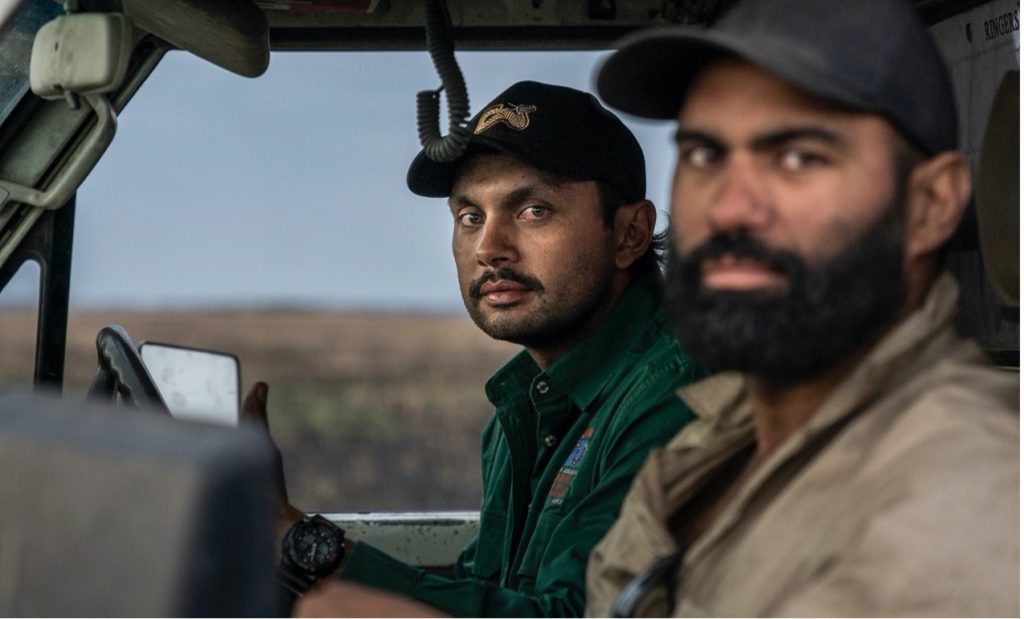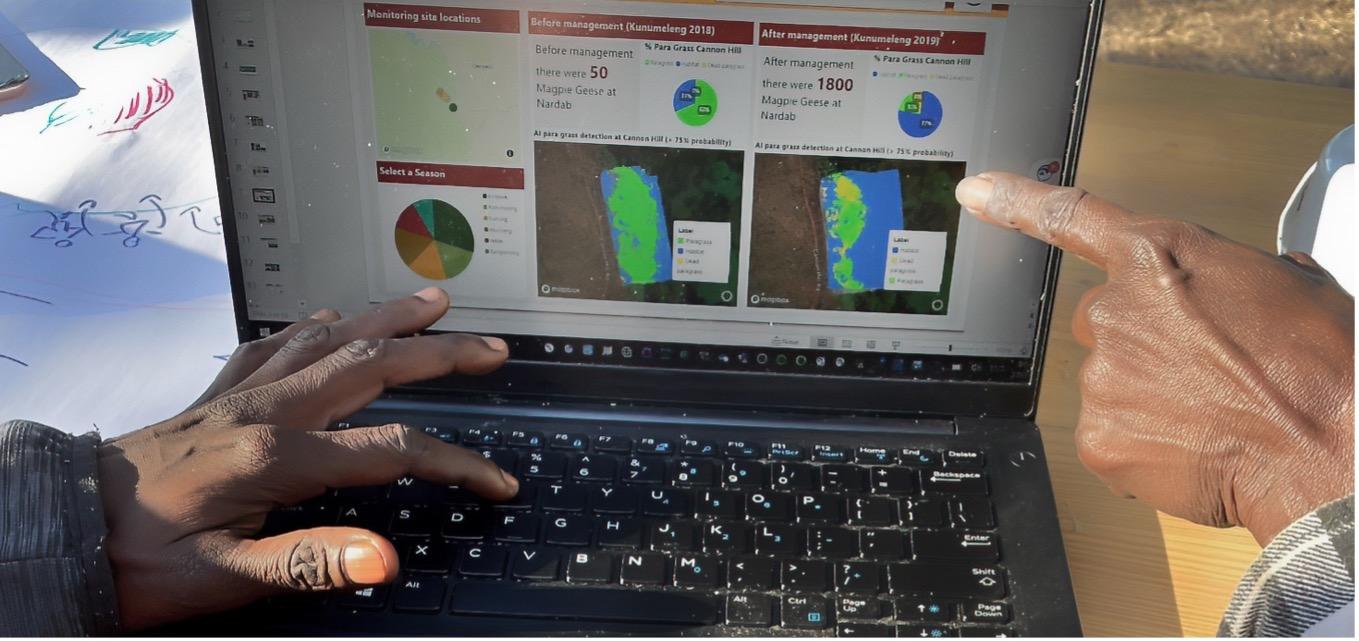27 September 2021
A new, $2.6 million, Indigenous-led program which aims to mobilise the latest digital technology for land and sea managers working in remote regions of northern Australia has been launched today.
The North Australian Indigenous Land and Sea Management Alliance (NAILSMA) and CSIRO, in collaboration with The Telstra Foundation, Microsoft, the Australian Government’s National Environmental Science Program (NESP) Resilient Landscapes Hub and the Women in STEM and Entrepreneurship program, unveiled the initiative which enables local Indigenous rangers to work with scientists and technology specialists to learn and use new inclusive AI and digital skills to monitor the health of their country.
With a focus on digital inclusion, the collaboration will see Indigenous rangers, tech companies and national research organisations working together to co-design a digital skills training program that will deliver environmental, cultural, and economic benefits for local Indigenous communities and land management. This initiative builds on the partnerships and innovations developed and tested through the Northern Australia Environmental Resources Hub.

Photo Caption: NAILSMA Team members Raph Clarke and Marius Clarke out on country with Aak Puul Ngantam Rangers and Traditional Owners.
The North Australian Land and Sea Management Alliance (NAILSMA) today announced a unique partnership between major digital technology and communications companies research institutions and Indigenous organisations to bring leading edge technology to the bush.
A new training program will build on the award-winning Healthy Country AI partnership co-developed with Traditional Owners, NESP scientists and Microsoft, which is a world-first program that mixes responsible artificial intelligence and modern science with traditional knowledge to solve complex environmental management problems, and care for animal species and habitats.
NAILSMA CEO, Ricky Archer, today welcomed this funding boost from the Healthy Country AI partners and says, this initiative will advance the important data collection and work Indigenous rangers are already doing.
We are very excited to receive support and facilitate this amazing partnership with big technology companies, researchers and Indigenous land managers. For Indigenous land managers, the success of new technology is measured through its on-ground application. We want this technology to provide Indigenous rangers with useful solutions to the problems they have identified. If its basic digital literacy skills that the rangers want, then that’s what we’ll create, all the way up to introducing advanced training modules such as drone surveying, to collecting and storing that important data using specialised software.
– Mr Ricky Archer, NAILSMA CEO
Five Indigenous organisations will help develop this program working across Cape York and the Northern Territory managing over 3 million hectares of globally important ecosystems and cultural landscapes.
We can now work directly with these 5 Indigenous organisations and prioritise what the values are for their country. For example, in Cape York, we know that feral pigs are threatening the sea turtle population by eating their eggs. The rangers there will now be able to better monitor and track activity in the area to help manage the problem. In the Territory we have the Kakadu Rangers wanting to manage the para grass which is an invasive weed affecting the magpie geese’ native habitat. So, you can see how valuable this technology is to expediate solutions for our wildlife and ecosystems.
– Mr Archer
“Modern partnerships require new skill sets for both Indigenous people and their partners and we need to think carefully about the role of technology on country. The advancement of digital technology can help transform the way Indigenous land managers look after Country. But we do not want these new technologies to replace people’s connection to Country, the best way to look after country is to be out on country. We need new technologies to support and add value to this concept rather than replacing it,” says Mr Archer.
Kalan Enterprises is one of the local groups who have committed to embedding the training to into their day-to-day operations.
Kalan Enterprises has committed to embedding new approaches to monitoring and reporting into our day-to-day operations over the next seven years as part of our Australian Government Funded-Indigenous Rangers extension. This training program is important to ensure that our people are doing all elements of this work from land management activities to managing data and reporting.
– Mr Dion Creek, Operations Director, Kalan Enterprises
The Telstra Foundation, in collaboration with Microsoft and the Women in STEM and Entrepreneurship program, are proud to support this training initiative. Jackie Coates, Head of Telstra Foundation, noted that Australia’s First Nations people have been successfully innovating for tens of thousands of years to create environmental, wellbeing and cultural outcomes.
This partnership is about working together to enhance digital skills so that more First Nations communities can use digital technologies in their caring-for-Country activities, in line with the wisdom of traditional Indigenous knowledge systems.
– Jackie Coates, Head of Telstra Foundation
Tianji Dickens, Philanthropies Lead at Microsoft, agrees and notes how such partnerships also provide important support networking opportunities for Indigenous women and men rangers who are caring for Country across Australia.
“This program shows how an Indigenous-led and collaborative approach to building and using digital technology can create real-world impact for Indigenous people.
– Tianji Dickens, Philanthropies Lead, Microsoft
Professor Michael Douglas, Leader of the NESP Resilient Landscapes Hub, is also a key partner for this effort. He said the program will build on relationships and projects established through the NESP Northern Hub to translate this research into action by empowering Indigenous rangers to use these tools on Country.

Bininj Traditional Owners in Kakadu National Park using an interactive data dashboard to explore changes coverage of weeds after management.
Dr. Justin Perry (NAILSMA), Dr Cathy Robinson (Australia’s national science agency, CSIRO), and Dr Jennifer Macdonald (CDU-CSIRO) will coordinate the on-ground digital training for the healthy Country monitoring program, which will be co-designed to suit local contexts and empower Indigenous rangers to build critical digital skills for future work on Country.
This collaboration will enable Indigenous rangers to drive and develop AI and digital support tools to support evidence-based decisions on their Country and also provide critical digital skills for future work on Country.
– Cathy Robinson, CSIRO
Core to this effort is Indigenous custodians and scientists working together to develop new ways and skills to apply science and Indigenous knowledge to produce practical solutions for conserving precious ecosystems.
– Dr Justin Perry, NAILSMA
The initiative will roll-out steadily over the next two years and a review of the initiative will assist in creating a model for rangers across the country to adopt.
Want to know more about the Resilient Landscapes Hub's activities and our research into practical solutions to environmental problems? Stay informed about activities, research, publications, events and more through the Hub newsletter.
"*" indicates required fields